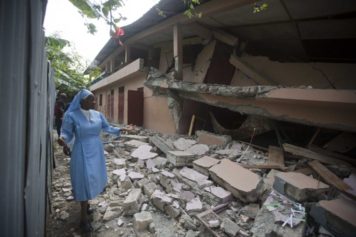An alliance of Quebec human rights groups raised an alarm Thursday as it released a study that questions the efficacy and ethics of Canada’s efforts to help Haiti rebuild four years after that country’s devastating earthquake.
The study, commissioned by Concertation pour Haiti, an alliance of Quebec groups that works to promote human rights in Haiti, suggests the Canadian government is refusing to give a detailed account of almost $555 million in aid to Haiti, an amount that represents more than two-thirds of Canada’s reported spending on Haiti’s reconstruction.
In addition to this lack of transparency, Paul Cliche, an anthropologist and researcher on development issues with the Université de Montréal, concludes in his study that Canada’s approach to humanitarian aid in Haiti is flawed on several fronts: For example, too much Canadian aid money has been spent on Band-Aid-type fixes, such as offering rental subsidies to persuade Haitians to move from emergency camps to substandard temporary housing, rather than building permanent homes or repairing damaged homes.
The Canadian government has supported mainly projects that further the economic interests of Canadian mining and textile companies, rather than the long-term economic interests of the Haitian people.
Haitian institutions and community groups, and even the Haitian government, have been excluded from the decision-making process regarding how international aid money is spent.
The United Nations Office for the Coordination of Humanitarian Affairs reported in September that almost 172,000 Haitians were still living in temporary camps, four years after the devastating earthquake of Jan. 12, 2010.
The earthquake destroyed about 200,000 homes. By last fall, only 26,547 of those homes had been repaired, and only 7,515 new homes had been built.
While offering rent subsidies of about $500 (U.S.) per family has been effective in persuading many earthquake victims to leave the camps, it is a short-term solution, the study notes. Most subsidy recipients could not afford to rent adequate housing longer than one year with that subsidy, and unemployment rates in Haiti are around 60 percent.
Cliche said at the news conference that the international community still seems to be operating in “emergency mode” in Haiti, whereby foreigners are doing the paid work and making the decisions, while Haitians are still living in unacceptable conditions and unemployed, or working for indecent wages.
Haiti is also experiencing a serious cholera epidemic, with 686,687 suspected cholera cases reported by the Haitian government as of October, and 8,398 deaths. Canada is not devoting sufficient funds to projects that tackle this public health crisis, the study concludes.
Canadians need to pressure their government to bring real help to Haiti with their aid dollars, said Michèle Asselin, coordinator of the Centre International de Solidarité Ouvrière, a group that forges links between labor unions in Quebec and workers in developing countries.
“Canada has taken the same approach as the World Bank in economic development … an approach which serves primarily Canada’s financial interests,” Asselin said.
She noted that many Haitian women now work in clothing assembly plants built in industrial parks in free-trade zones in Haiti. At many of these plants, which are supplying Canadian and American clothing manufacturers, workers toil in inhumane conditions for less than $5 a day. And Canadian and American mining companies are taking advantage of Haiti’s weak government to sign agreements on projects that pay very low royalties to the state, employ few locals and threaten the natural environment.
“This is not an economic development model that serves workers, the local economy or the national economy of Haiti. It serves the big Canadian companies that subcontract to these factories,” or mine for gold and copper in the country, she said.
The group that commissioned the study is demanding a meeting with Foreign Affairs Minister John Baird and Minister of International Development Christian Paradis.
Charleen Bortot, a spokesperson for Foreign Affairs, Trade and Development Canada, said ministry officials were taking a look at the study but did not have a comment by press time Thursday.
Source: montrealgazette.com


